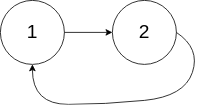Leetcode 0141. Linked List Cycle
Given `head`, the head of a linked list, determine if the linked list has a cycle in it. There is a cycle in a linked list if there is some node in the list that can be reached again by continuously following the `next` pointer. Internally, `pos` is used to denote the index of the node that tail's `next` pointer is connected to. Note that `pos` is not passed as a parameter.
Description
Given head, the head of a linked list, determine if the linked list has a cycle in it.
There is a cycle in a linked list if there is some node in the list that can be reached again by continuously following the next pointer. Internally, pos is used to denote the index of the node that tail’s next pointer is connected to. Note that pos is not passed as a parameter.
Return true if there is a cycle in the linked list. Otherwise, return false.
Example 1:
Input: head = [3,2,0,-4], pos = 1
Output: true
- There is a cycle in the linked list, where the tail connects to the 1st node (0-indexed).
Example 2:
Input: head = [1,2], pos = 0
Output: true
- There is a cycle in the linked list, where the tail connects to the 0th node.
Example 3:
Input: head = [1], pos = -1
Output: false
- There is no cycle in the linked list.
Constraints:
- The number of the nodes in the list is in the range
[0, 10^4]. -10^5 <= Node.val <= 10^5posis-1or a valid index in the linked-list.
Follow up
- Can you solve it using
O(1)(i.e. constant) memory?
Solution
1
2
3
4
5
6
7
8
9
10
11
12
13
14
15
16
17
18
19
20
21
22
23
24
25
26
27
28
29
30
31
32
33
34
35
36
37
38
39
40
41
42
43
44
/**
* Definition for singly-linked list.
* class ListNode {
* int val;
* ListNode next;
* ListNode(int x) {
* val = x;
* next = null;
* }
* }
*/
public class Solution {
/**
* Iterative Approach
* Analysis
* Time Complexity: BigO(n)
* Space Complexity: BigO(n)
*/
public static boolean hasCycle(ListNode head) {
HashSet<ListNode> set = new HashSet<>();
while (head != null) {
if (!set.add(head)) return true;
head = head.next;
}
return false;
}
/**
* Floyd's tortoise and hare (Two Pointers)
* Analysis
* Time Complexity: BigO(n)
* Space Complexity: BigO(1)
*/
public static boolean hasCycle(ListNode head) {
ListNode fast = head;
ListNode slow = head;
while (fast != null && fast.next != null) {
fast = fast.next.next;
slow = slow.next;
if (fast == slow) return true;
}
return false;
}
}
This post is licensed under CC BY 4.0 by the author.



